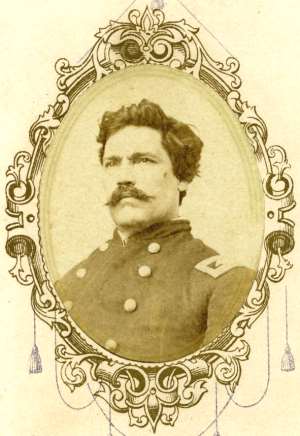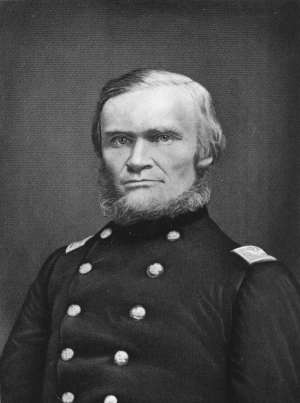Search:
Powered by
Website Baker
Who was in command of the Third Division in the Right Wing, 16th Army Corp? |
| Posted by The Muse (themuse) on Jun 06 2015 |
A number of authors (Monnett in Action Before Westport on page 146 and, most recently, Forsyth in The Great Missouri Raid) list Colonel David Moore as the commander of the Third Division in Major General A. J. Smith's Right Wing, 16th Army Corps. My research leads me to conclude that the commander of the Third Division was actually Colonel William T. Shaw.
Now don't get me wrong. Colonel Moore did command the Third Division both before and after Price's Raid. He just didn't command during the raid. Here's my evidence.
 Colonel David Moore was born in Ohio but moved to Missouri in 1850. A veteran of the War with Mexico, Moore recruited the 21st Missouri Volunteer Infantry Regiment in 1862. Here's a brief bio from History of Lewis, CLark, Knox and Scotland Counties, Missouri publihed in 1887.
Colonel David Moore was born in Ohio but moved to Missouri in 1850. A veteran of the War with Mexico, Moore recruited the 21st Missouri Volunteer Infantry Regiment in 1862. Here's a brief bio from History of Lewis, CLark, Knox and Scotland Counties, Missouri publihed in 1887.
In 1850 [David Moore] came to Missouri, and engaged in farming and merchandising until the civil war. In 1861 he organized the first Northeast Missouri Reserve Corps, by order of Gen. Lyon. He was its colonel, and was at the battle of Athens, at Lancaster and other places. In February, 1862, he organized the famous Twenty-first Missouri Regiment, and was elected colonel, serving until 1865. He was then breveted brigadier-general, and in the following spring organized the Fifty-first Missouri Regiment, and commanded this and the post of St Louis, and the First District of Missouri, until the close of the war. His gallantry and bravery are matters of history. He was wounded three times at the battle of Shiloh, from the efects of which he lost his right leg, but after only a ninety days’ absence he resumed command.
 Colonel William T. Shaw was born in Maine moved to west to Kentucky, spent some time in California before settling in Iowa in 1854. A veteran of the War with Mexico, and was commissioned colonel of the 14th Iowa Volunteer Infantry Regiment in 1861. Here's a brief bio of Shaw from the Annals of Iowa.
Colonel William T. Shaw was born in Maine moved to west to Kentucky, spent some time in California before settling in Iowa in 1854. A veteran of the War with Mexico, and was commissioned colonel of the 14th Iowa Volunteer Infantry Regiment in 1861. Here's a brief bio of Shaw from the Annals of Iowa.
Returning from the war [with Mexico] Shaw strayed into Arkansas and the Indian territory, finding his way some months later to California where he engaged in mining until 1851, when he came to Iowa. He returned in 1852 to California, coming back, however, to Anamosa [Iowa] in 1854, which was thenceforward his permanent home. He was commissioned Colonel of the 14th Iowa Infantry in 1861, serving three years, participating in the battles of Donelson, Shiloh, Pleasant Hill, Yellow Bayou, and many affairs of lesser note. When he finally retired from the army in 1864, Maj. Gen. A. J. Smith paid him the highest compliments for his "courage, patriotism and skill," during the fifteen months that he had commanded a post, brigade and division in the 16th Army Corps.
On May 31, 1864, Colonel David Moore was listed as the commander of the Third Division, Right Wing, 16th Army Corps in the official returns from the Department of the Cumberland, Major General George H. Thomas commanding. At this time the Third Division was in Vicksburg, Mississippi. [Official Records, Volume 39, Part 2, 62-71]
On July 31, 1864, Major General A. J. Smith issued Special Orders, No. 91 from his headquarters of the Right Wing, 16th Army Corps in Memphis, Tennessee. [Official Records, Volume 39, Part 2, 215]
Col. William T. Shaw, Fourteenth Iowa Infantry, senior officer, is hereby assigned to and will at once assume command of the Third Division, Sixteenth Army Corps, relieving Col. D. Moore, Twenty-first Missouri Volunteers.
A few days after Price's army had been shattered at Mine Creek, the two infantry divisions from the Right wing, 16th Army Corps were ordered to stop their pursuit of Sterling Price and head east. Shaw's enlistment was up and was to be mustered out of the army. On October 29, 1864 while in Harrisonville, Missouri, Major General A. J. Smith issued Special Orders, No. 132 to thank Colonel Shaw for his service. [Official Records, Volume 41, Part 4, 314]
I. Col. William T. Shaw, Fourteenth Iowa Infantry Volunteers, is hereby relieved from the command of the Third Division, Sixteenth Army Corps, and will forthwith rejoin his regiment at Davenport, Iowa. The quartermaster's department will furnish the necessary transportation for himself and authorized servants and horses.
II. In relieving Colonel Shaw from the command of the Third Division prior to his being mustered out, it is but an act of justice to an energetic, thorough, and competent officer to say that for the last fifteen months he has been in this command as commanding a post, brigade, and division, and in every position has performed the incumbent duties faithfully and well and with an ability that few can equal, with courage, patriotism, and skill. Above question the service loses an excellent [officer] when he is mustered out.
That same day, Colonel David Moore issued General Orders, No. 20 from the headquarters of the Third Division. [Official Records, Volume 41, Part 4, 314]
In compliance with Special Orders, No. 132, dated at headquarters Right Wing, Sixteenth Army Corps, Harrisonville, Mo., October 29, l864, the undersigned hereby assumes command of the Third Division, Sixteenth Army Corps.
So in conclusion, Colonel David Moore did command the Third Division, Right, Wing, 16th Army Corp. He just wasn't in command during the cavalry raid into Missouri by Sterling Price during the fall of 1864.
Last changed: Jun 06 2015 at 1:16 PM
Back